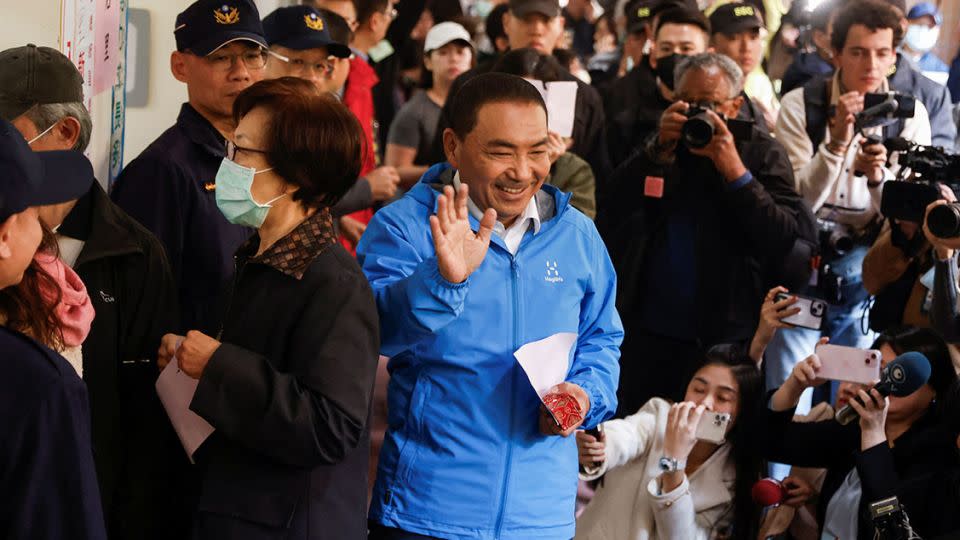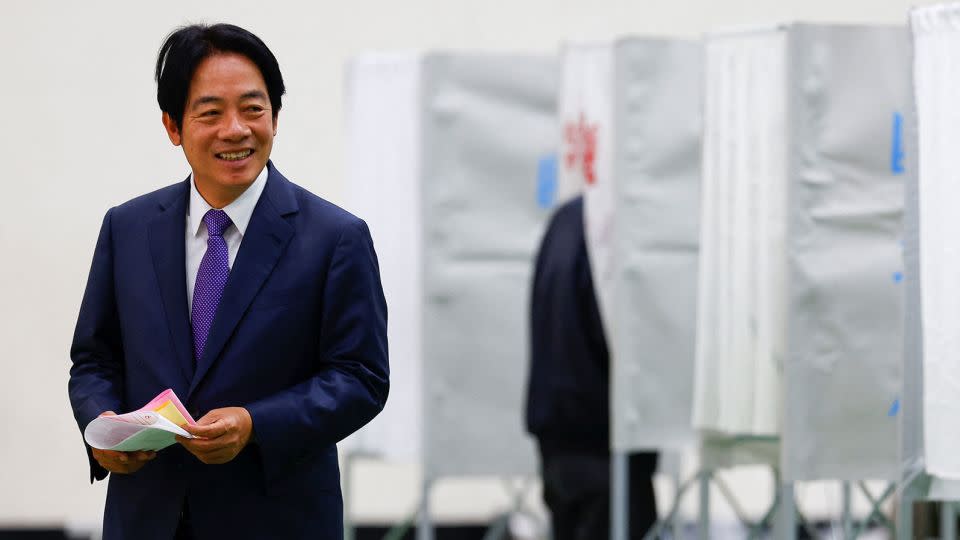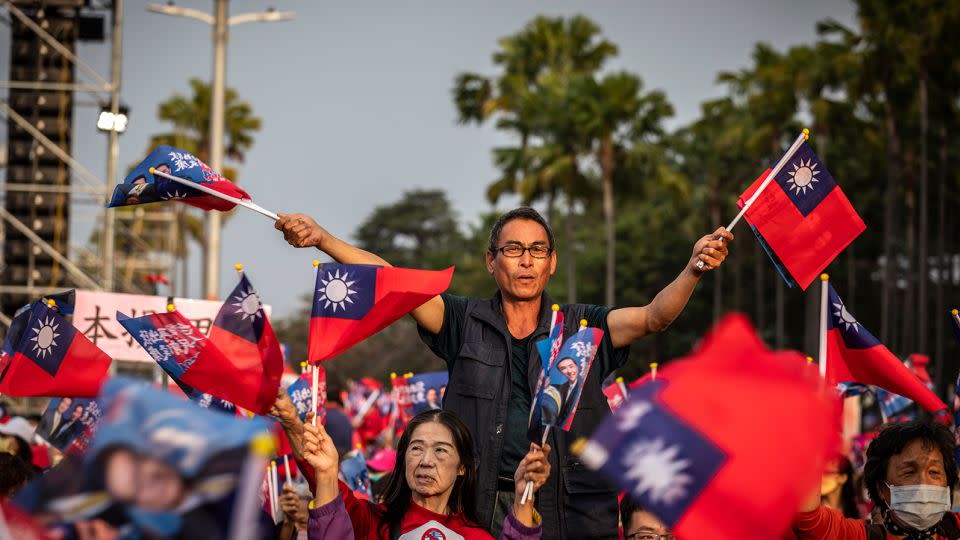Taiwan votes for a new president against a backdrop of growing China threats
- Oops!Something went wrong.Please try again later.
Taiwan began counting votes on Saturday evening in a closely watched election that could reverberate far beyond its shores after years of growing threats from Beijing, which warned this week the island’s future is at a “crossroads.”
The self-governing island of 23.5 million people will choose both a new president and parliament at a time of heightened tension with China, which under leader Xi Jinping has become much more powerful – and increasingly belligerent toward Taiwan.
Polls closed at 4pm (3am Eastern Time) and the result is expected a few hours later under Taiwan’s famously efficient and transparent counting process.
The boisterous election campaign, itself an illustration of Taiwan’s vibrant democratic credentials, has been fought over a mixture of livelihood issues as well as the thorny question of how to deal with its authoritarian neighbor to the northwest.
China’s ruling Communist Party claims Taiwan as its territory, despite having never controlled it. And Xi has called Taiwan’s unification with the mainland “a historical inevitability.”
The results will not only decide Taiwan’s future, but could also reshape its relations with Beijing and pose a test to the latest efforts by the United States and China to stabilize rocky ties.
Beijing, which routinely sends fighter jets and warships close to Taiwan’s skies and waters, has framed the vote as a choice between “peace and war, prosperity and decline.” On Wednesday, it warned Taiwan’s voters to “make the right choice at the crossroads of cross-strait relations” while railing against the Democratic Progressive Party (DPP), which has won Taiwan’s last two presidential elections.
In the final days leading up to the vote, candidates toured major cities around the island to stage nightly campaign rallies, featuring rock music, emotional speeches and the rhythmic chanting of slogans by large crowds.



Three men with different visions
Three men are vying to succeed President Tsai Ing-wen, the island’s first female leader.
Over the last eight years, Tsai has raised Taiwan’s global profile, strengthened its ties with democratic powers and pursued progressive policies at home, including making Taiwan the first place in Asia to legalize same-sex marriage – though her party has also come under criticism over economic issues.
Relations with China nosedived after Beijing cut off most communications with Taipei in response to her 2016 election win, and further stepped up economic and military pressure following her landslide re-election four years later.
Tsai’s current vice president, Lai Ching-te, is hoping to win a third term for the ruling DPP, which champions Taiwan’s de-facto sovereignty and separate identity from China. That would be unprecedented in the island’s nearly three decades of democratic history and represent a further rejection by Taiwanese voters of Beijing’s strongarm tactics.
Hou Yu-ih, a mayor and former police chief, is the candidate for the main opposition party Kuomintang (KMT), which traditionally favors closer cross-strait ties. A victory for the KMT would be welcome to Beijing and signal that voters might want to deescalate tensions.
The third contender, Ko Wen-je, hails from the Taiwan People’s Party (TPP), which he founded in 2019 to challenge the island’s political duopoly. Ko also favors closer ties with China but says he will be less deferential to Beijing than the KMT.
The race is tight. Final polls before the 10-day blackout period showed Lai had a slight edge over Hou, followed by Ko.
Beijing, which openly loathes the DPP and Lai and favors a win by the KMT’s Hou, has stepped up pressure on Taiwan ahead of the vote.
It slapped sanctions on Taiwanese exports, flew spy balloons over the island, and showed off a new aircraft carrier, the Fujian, named after the mainland province closest to Taiwan.
Taipei has also accused Beijing of ramping up disinformation campaigns and magnifying talking points favorable to China-friendly candidates as part of its election interference.
China has long used a mixture of carrot and stick to woo Taiwan but over the last eight years it has mostly been stick. That increasingly bellicose stance – and the country’s authoritarian turn under Xi – has pushed Taiwan’s public further away: Less than 10% now support an immediate or eventual unification, and less than 3% identify primarily as Chinese.

A 33-year-old writer, who only gave his surname Tsang, said he cared the most about cross-strait relations and Taiwan’s democratic values.
“Taiwan is a different country from China, and we need to let the international world know that we are different,” he told CNN at a DPP rally on Thursday.
But relations with China is not the only thing on Taiwan voters’ minds.
Despite the growing threats from Beijing, some people, especially younger voters, say China is not their biggest concern in this election – because they don’t think the status quo will change in the short term anyway, despite Xi’s rhetoric.
Instead, they care more about the economy and livelihood issues, from Taiwan’s notoriously stagnant wages to its unaffordable homes.
Analysts say that is an area where the TPP – which advertises itself as a “pragmatic” “middle-way” party – has attracted young voters.
“The leaders often say that our economy has improved. But we really don’t feel that on a local level,” a transport sector worker and father of two children surnamed Wu said at a TPP rally Thursday.
“What we see is that housing prices and cost of living have been going up, so people have to be really careful about how they spend their money,” he added.
The whole island has been on the move since Friday – Taiwan doesn’t allow absentee ballots, meaning voters must travel to their home counties to cast their ballots.
Almost all high-speed train tickets leaving Taipei for the southern part of the island during daytime Friday and Saturday have been sold out days in advance.
Some voters have also traveled back from overseas.
Peter Kuo, a partner at a financial institution based in Hong Kong, was among those traveling back.
“It is more often than not always a close election,” he told CNN. “And that creates an additional incentive for people to come back and want to actually cast the ballot.”
“While most of the news is around the relationship between Taiwan and China, the reality is a lot of issues that become increasingly critical are the direction of the economy in the future,” he added.
But Dan Chang, 36, who also works in finance in Hong Kong, said the most important issue for him was Taiwan’s sovereignty – he never trusted China, and Beijing’s crackdown on Hong Kong has only strengthened his belief, he said.
“If Taiwan didn’t have China as a neighbor today, I might not be so motivated to go back and vote,” he said.
For more CNN news and newsletters create an account at CNN.com

